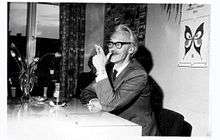Kornel Filipowicz
Kornel Filipowicz (27 October 1913 – 28 February 1990) was a Polish novelist, poet and screenwriter, most notable for his short stories.[1][2][3][4]
Kornel Filipowicz | |
|---|---|
 Kornel Filipowicz in Andrychów, 1970 | |
| Born | 27 October 1913 Ternopil |
| Died | 28 February 1990 (aged 76) Kraków |
| Occupation | Novelist, screenwriter, poet |
| Citizenship | Polish |
| Period | 1947–1984 |
| Spouse | Maria Jarema |
Works (selection)
Poetry
- Mijani (The Ones Passed By, 1943)
- Powiedz to słowo (Say This Word, 1997)
Prose
- Krajobraz niewzruszony (Landscape Unmoved, 1947)
- Księżyc nad Nidą (The Moon Over Nida, 1950)
- Ulica Gołębia (Gołębia Street, 1955)
- Ciemność i światło (Darkness and Light, 1959)
- Biały ptak (A White Bird, 1960)
- Romans prowincjonalny (A Provincial Romance, 1960)
- Pamiętnik antybohatera (The Memoir of an Anti-Hero, 1961; English translation by Anna Zaranko, 2019, winner of the Found in Translation Award 2020)
- Mój przyjaciel i ryby (My Friend and Fishes, 1963)
- Jeniec i dziewczyna (A Captive and A Girl, 1964)
- Ogród pana Nietschke (The Garden of Mr. Nietschke, 1965)
- Mężczyzna jak dziecko (A Man As a Child, 1967)
- Co jest w człowieku (What's In the Man, 1971)
- Śmierć mojego antagonisty (The Death of My Antagonist, 1972)
- Gdy przychodzi silniejszy (When the Stronger, 1974)
- Kot w mokrej trawie (A Cat In a Wet Grass, 1977)
- Dzień wielkiej ryby (The Day of a Great Fish, 1978)
- Zabić jelenia (To Kill a Deer, 1978)
- Krajobraz, który przeżył śmierć (The Landscape That Survived the Death, 1986)
- Rozmowy na schodach (Conversations At the Stairs, 1989)
- Wszystko, co mieć można (All That One Can Have, 1991)
Screenplays
- Trzy kobiety (Three Woman, 1956)
- Miejsce na ziemi (A Place on Earth, 1959)
- Głos z tamtego świata (The Voice From the Other World, 1962)
- Piekło i Niebo (Heaven and Hell, 1966)
- Szklana kula (Crystal Ball, 1972)
Awards
- Gold Cross of Merit (1955)
- Officer's Cross of Polonia Restituta (1963)
gollark: You did not sleep very long, wow.
gollark: Which you installed on something with a locked bootloader how?
gollark: Imagine running Android with Google services, as opposed to not doing so.
gollark: As planned.
gollark: Yes.
References
- J. Golec, S. Bojda (1998). Słownik biograficzny ziemi cieszyńskiej. 3. Cieszyn. pp. 66–67.
- Słownik Pisarzy Polskich. Kraków: Krakowskie Wydawnictwo Naukowe. 2008. p. 1144. ISBN 978-83-7435-787-6.
- Janusz R. Kowalczyk. "Kornel Filipowicz" (in Polish). Culture.pl. Retrieved 11 October 2015.
- "Kornel Filipowicz" (in Polish). Filmpolski.pl. Retrieved 11 October 2015.
This article is issued from Wikipedia. The text is licensed under Creative Commons - Attribution - Sharealike. Additional terms may apply for the media files.